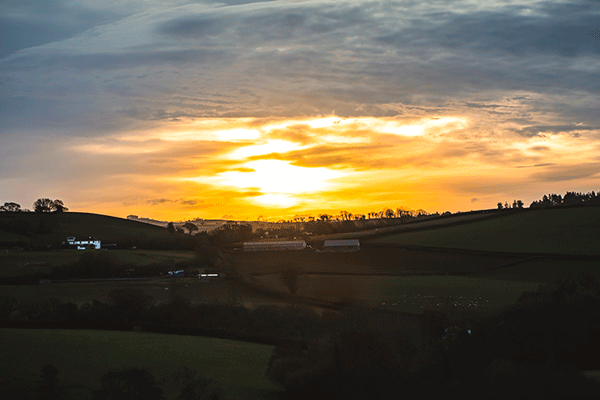If you want everyone to pull in the same direction, it is important to agree on a destination. So, we have just released Riverford’s second annual Sustainability Report – detailing where we are headed, how we will get there, and our progress so far, with a few measurable milestones to keep us on track. The climate crisis is at the heart of the report, but it also embraces social justice, B Corp certification, plastic usage, and other ethical issues.
I am very proud of what our sustainability and ethics Manager, Zac, has achieved, with the support of our 1,030 co-owners; the report is thorough, thoughtful, and honest about what we currently measure (and what we don’t), where progress is good, and where we can improve.
We have come a long way in the three years since we first started measuring our carbon footprint annually. I am confident that we will go even further in the next three years, moving towards our agreed destination of net zero emissions by 2030. However, as well as we are doing, there is a bigger picture.
Reading this report, some might be tempted to hold Riverford up as an example of what all businesses could do in the absence of government action. But we are unique and privileged in so many ways: we are employee owned, largely free of debt, and not beholden to impatient investors. Many of our customers have the financial freedom to make choices denied to some – and even more importantly, they are extraordinarily interested, educated, and supportive of our ethical choices.
Don’t let our progress be a fig leaf to cover the government’s inadequacy. Rather than showing that it is possible for businesses to find the solutions to get us out of the mess we are all in, Riverford may be the exception that proves the rule. Let’s be honest; most businesses, especially large ones, exist to make money for their owners. It is more or less enshrined in law.
Businesses can be extraordinarily innovative in finding solutions and implementing them fast, but we desperately need the government to provide a framework that incentivises a drastic reduction in the burning of fossil fuels. That can only mean making them more expensive, either through direct taxation, or indirectly through a meaningful carbon tax. With the Doomsday Clock at 100 seconds to midnight, this simple, blindingly obvious solution is all that matters.
You can read our full Sustainability Report online here.
If you have any trouble accessing the animated PDF above, try this simplified version.












Taxing CO2 and CO2 equivalent emitters has a role in driving behaviour change. This applies not only to energy sources in industry and transportation but also agriculture. The livestock sector requires a significant amount of natural resources and is responsible for about 14.5% of total anthropogenic greenhouse gas emissions (7.1 Gigatonnes of carbon dioxide equivalents for the year 2005; Gerber et al., 2013). Livestock agriculture tends to receive government subsidies rather than taxation.
It might be time to consider fuel rationing. It has the advantage, if carefully adminstered by government, that everybody is constrained by it, not just the poorest, as is the case with extra tax. The experience of the pandemic ought to have got us used to government mandates, so now is the time.
Brilliant 0n your report….
But ( and you knew there was a ‘but’ coming!!!) :
Life on this planet is not sustainable at current and past levels of emission and even if we stop producing CO2 the residual effect will be there for a considerable time – tipping points have been/will be exceeded and non-reversible feedback systems have been/will be initiated . So there is a real need for regenerative action to save and enhance what’s left. The question ‘How?’ hits home when there is a realisation that every sentient and ‘non’ sentient being on this little blue dot has inalienable rights and some of us have even greater responsibilities as well as rights. Tax systems, whether on greenhouse gas production or for health etc for example are a response to capitalistic mechanisms that have no regard for the aforementioned beings or the health of the planet. How do we ‘level up’ in a capitalistic system when some of us do not/cannot wealth create and , in fact do not want to wealth create in the ‘traditional’ sense of the word? Money- Capitalism- More Money (M-C-M’). As Guy says the role of profit ( thereby M’) is legally enshrined in company law and the intention of capitalists, on the whole, is to accrue profit regardless of taxation for whatever reason. So we have ‘green capitalism’, ‘disaster capitalism’, ‘military capitalism’ ( AUKUS for example)…..
And the big problem is the shortage of time. Looking at my bookshelf I see ( obviously a classic) ‘Silent Spring’1962, ‘A Green Manifesto ( Iirvine and Ponton) 1988. ‘Blueprint for a Green Economy(Pearce et al for the UK Dept of Environment) 1989 and a whole succession of books to the present day like lines in the sand of an Anthropocene desert extolling how we can get to a safe and secure place….and do you know, folks , even after COP(n+1) we will be no closer…
Sorry to be depressive and rant nearly over and a good, good read is ‘The Tragedy of the Worker; Towards the Proletarocene’ The Salvage Collective , Verso. A chapter quote ‘The basis of optimism is sheer terror’ …..and there is always hope…the two things are different.